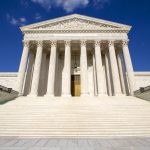The Supreme Court recently issued a major victory for LGBTQ employees that will reverberate in companies across the country: Title VII of the 1964 Civil Right Act makes it unlawful to discriminate against LGBTQ workers.
The case is Bostock v. Clayton County, Georgia, and in a 6-3 ruling delivered during Pride Month, the Supreme Court held that an employer may not discriminate against any individual because of their sex and that “the straightforward application of Title VII’s terms” means that “sex” includes different treatment based on one’s homosexuality or transgender status.
The decision is historic for a number of reasons, including that it provides nation-wide protection for LGBTQ employees, rather than the patchwork of state and local laws that currently prohibit LGBTQ discrimination.
The Facts
The Supreme Court’s opinion grew out of three separate cases involving different employees and companies, in which the employers allegedly fired the employees for being homosexual or transgender:
- “Clayton County, Georgia, fired Gerald Bostock for conduct ‘unbecoming’ a county employee shortly after he began participating in a gay recreational softball league. “
- “Altitude Express fired Donald Zarda days after he mentioned being gay.”
- “R. G. & G. R. Harris Funeral Homes fired Aimee Ste-phens, who presented as a male when she was hired, after she informed her employer that she planned to ‘live and work full-time as a woman.’”
Each worker sued their employer for sex discrimination under Title VII of the Civil Rights Act of 1964. The different federal courts of appeal disagreed on the issue of whether Title VII protects LGBTQ employees and so the cases made their way to the Supreme Court for an ultimate decision.
The Supreme Court’s Ruling
In a forceful introduction to the opinion, Justice Gorsuch notes the enduring importance of Title VII of the 1964 Civil Rights Act, in which Congress outlawed discrimination in the workplace on the basis of race, color, religion, sex, or national origin. The stakes of the case are then made clear: “Today, we must decide whether an employer can fire someone simply for being homosexual or transgender. The answer is clear. An employer who fires an individual for being homosexual or transgender fires that person for traits or actions it would not have questioned in members of a different sex. Sex plays a necessary and undisguisable role in the decision, exactly what Title VII forbids.”
 The opinion addresses the argument that Congress in 1964 could not possibly have meant to outlaw discrimination against homosexuality or transgender status. While acknowledging that “those who adopted the Civil Rights Act might not have anticipated their work would lead to this particular result[,]” the Court noted that Congress probably also hadn’t been “thinking about many of the Act’s consequences that have become apparent over the years, including its prohibition against discrimination on the basis of motherhood or its ban on the sexual harassment of male employees.” Ultimately, “the limits of the drafters’ imagination supply no reason to ignore the law’s demands. When the express terms of a statute give us one answer and extra-textual considerations suggest another, it’s no contest. Only the written word is the law, and all persons are entitled to its benefit.”
The opinion addresses the argument that Congress in 1964 could not possibly have meant to outlaw discrimination against homosexuality or transgender status. While acknowledging that “those who adopted the Civil Rights Act might not have anticipated their work would lead to this particular result[,]” the Court noted that Congress probably also hadn’t been “thinking about many of the Act’s consequences that have become apparent over the years, including its prohibition against discrimination on the basis of motherhood or its ban on the sexual harassment of male employees.” Ultimately, “the limits of the drafters’ imagination supply no reason to ignore the law’s demands. When the express terms of a statute give us one answer and extra-textual considerations suggest another, it’s no contest. Only the written word is the law, and all persons are entitled to its benefit.”
As a result, the Supreme Court announced a clear rule: “An employer violates Title VII when it intentionally fires an individual employee based in part on sex. . . . [b]ecause discrimination on the basis of homosexuality or transgender status requires an employer to intentionally treat individual employees differently because of their sex, an employer who intentionally penalizes an employee for being homosexual or transgender also violates Title VII.”
This rule flows directly from prior Supreme Court holdings that an individual employee’s sex is “not relevant to the selection, evaluation, or compensation of employees.” Price Waterhouse v. Hopkins, 490 U. S. 228, 239 (1989) (plurality opinion). And Title VII’s message for the cases in the Bostock decision “is equally simple and momentous: An individual’s homosexuality or transgender status is not relevant to employment decisions. That’s because it is impossible to discriminate against a person for being homosexual or transgender without discriminating against that individual based on sex.”
Potential Intersection With Religious Organizations/Employers Down The Road
 The Supreme Court clarified that its ruling applies only to employment decisions and does not purport to address issues like sex-segregated bathrooms and locker rooms. Likewise, the ruling discussed how this decision may intersect with religious liberties and laws such as the Religious Freedom Restoration Act of 1993 and Title VII’s express statutory exemption for religious organizations. These issues, however, were not before the Court and thus “how these doctrines protecting religious liberty interact with Title VII are questions for future cases too.”
The Supreme Court clarified that its ruling applies only to employment decisions and does not purport to address issues like sex-segregated bathrooms and locker rooms. Likewise, the ruling discussed how this decision may intersect with religious liberties and laws such as the Religious Freedom Restoration Act of 1993 and Title VII’s express statutory exemption for religious organizations. These issues, however, were not before the Court and thus “how these doctrines protecting religious liberty interact with Title VII are questions for future cases too.”
Key Takeaway
This ruling is a major shift in the employment law landscape and a watershed day for this country and the LGBTQ community. Employers are now prohibited from discriminating against LGBTQ employees and those who do so are subject to Title VII’s considerable reach and remedies against unequal treatment.
